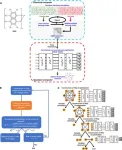Award for dementia researcher from New York City
Groundbreaking insights into the genetics of brain diseases
2023-07-12
(Press-News.org)
This year’s “Hartwig Piepenbrock-DZNE Prize”, endowed with 60,000 euros, goes to the British neuroscientist Alison Goate, DPhil. The award recognizes her outstanding contributions to research into Alzheimer’s disease and frontotemporal dementia. Professor Goate researches and teaches at the Icahn School of Medicine at Mount Sinai, an international leader in biomedical education, research, and patient care located in New York City. The prize is presented jointly by the Piepenbrock Group and the German Center for Neurodegenerative Diseases (DZNE). The award ceremony will take place in Bonn, Germany next December.
“Alison Goate has been a leading authority on the genetic factors of dementia for more than thirty years,” said Professor Pierluigi Nicotera, Chairman of DZNE’s Executive Board. “Her research has provided major insights into the disease process and contributed to the development of novel treatment options.”
“Alzheimer’s and other neurodegenerative diseases need more publicity and awareness. The Hartwig Piepenbrock-DZNE Prize is our way of supporting this,” said Olaf Piepenbrock, managing partner of the Piepenbrock Group. “The scientists are making an important contribution and thus laying the foundation for new possibilities for prevention and treatment. Neurodegenerative diseases cause enormous physical and psychological burdens - not only for patients, but also for caregiving relatives. It is important to us to bring Alzheimer’s and other neurodegenerative diseases into the public discussion and to create a better understanding of the needs of affected patients and their family members.”
About the Laureate
Alison Mary Goate was born in the UK and studied at the University of Bristol and the University of Oxford. She worked at Washington University in St. Louis from 1992 to 2014 prior to joining Icahn School of Medicine in 2015. She is founding director of the Ronald M. Loeb Center for Alzheimer’s Disease at Mount Sinai in New York City. Her research is directed at hereditary factors that play a role in neurodegenerative diseases. Over the years, Dr. Goate has been involved in the discovery of several gene variants (mutations) that are relevant to Alzheimer’s disease and frontotemporal dementia: Some of these mutations actually cause disease, while others just increase the risk of disease. Goate’s research has laid important groundwork for the development of so-called anti-amyloid and anti-tau agents. Anti-amyloid drugs have recently been approved in the U.S. for the treatment of Alzheimer’s disease, while anti-tau agents are still being tested. Goate has already been honored multiple times for her scientific achievements.
https://icahn.mssm.edu/profiles/alison-m-goate,
http://labs.neuroscience.mssm.edu/project/goate-lab/
https://icahn.mssm.edu/research/loeb-alzheimers
About the Hartwig Piepenbrock-DZNE Prize
Since 2011, the “Hartwig Piepenbrock-DZNE Prize” has been awarded every two years for outstanding research on neurodegenerative disorders. These diseases, which include Alzheimer’s, Parkinson’s and Amyotrophic lateral sclerosis (ALS), are characterized by dysfunctions and death of neurons. This can lead to dementia, movement disorders or other severe health problems. To date there are no cures. The prize is sponsored by the Piepenbrock Group and awarded in remembrance of its former Chief Executive Officer and Chairman Hartwig Piepenbrock, who passed away after suffering from dementia. He was committed to the arts, science, and society for many years. Prize winners are selected by an international committee, coordinated by DZNE. On this occasion, the prize will be awarded for the seventh time.
https://www.dzne.de/en/news/prizes-and-awards/hartwig-piepenbrock-dzne-prize/
--
About the Deutsches Zentrum für Neurodegenerative Erkrankungen, DZNE (German Center for Neurodegenerative Diseases): DZNE is a research institute funded by the German federal and state governments, comprising ten sites across Germany. It is dedicated to diseases of the brain and nervous system, such as Alzheimer’s, Parkinson’s, and ALS, which are associated with dementia, movement disorders and other serious health impairments. To date, there are no cures for these diseases, which represent an enormous burden for countless affected individuals, their families, and the healthcare system. The aim of DZNE is to develop novel strategies for prevention, diagnosis, care, as well as treatment, and to transfer them into practice. To this end, DZNE cooperates with universities, university hospitals, research centers and other institutions in Germany and abroad. The institute is a member of the Helmholtz Association and belongs to the German Centers for Health Research. www.dzne.de/en
About the Piepenbrock Group: The Piepenbrock Group has represented professional building services for more than 100 years. Managed by the fourth generation of owners, Piepenbrock today offers a broad spectrum of services in Facility Management, Cleaning Services, Maintenance and Security. Piepenbrock is also one of Germany’s leading providers of special services, which includes clean room cleaning, winter services and park maintenance. Quality and sustainability are two important aspects that ensure the company remains at the top of its game. Website: www.piepenbrock.de/en
END
ELSE PRESS RELEASES FROM THIS DATE:
2023-07-12
Synthetic polymer materials, such as plastics and rubbers, have become ubiquitous in our daily lives. It is, therefore, essential to ensure that they are safe, durable, and sustainable. This is especially true for synthetic latex films, which are widely used in packaging, biomedicine, and electronics.
But what exactly are synthetic latex films? Simply put, they are a type of nanoparticle-based films that are produced by drying out a mixture of polymer nanoparticles and water. As the solvent evaporates, the nanoparticles become more packed until finally the interactions between polymer chains at the boundaries of nanoparticles create a coherent film. Unfortunately, the latex films ...
2023-07-12
Over the past decade, organic luminescent materials have been recognized by academia and industry alike as promising components for light, flexible and versatile optoelectronic devices such as OLED displays. However, it is a challenge to find suitably efficient materials.
To address this challenge, a joint research team has developed a novel approach combining a machine learning model with quantum-classical computational molecular design to accelerate the discovery of efficient OLED emitters. This research was published May 17 in Intelligent Computing, a Science Partner Journal.
The ...
2023-07-12
INDIANAPOLIS – A new study of caregivers of LGBT older adults living with Alzheimer’s disease provides rare insight into the intersection of caregiving and the LGBT experience.
Researchers from Regenstrief Institute and the medical schools of Indiana University and University of Colorado report that many common caregiver experiences -- such as feelings of social isolation and of being overwhelmed -- are similar for caregivers, whether an individual with Alzheimer’s disease is LGBT or not. However, because LGBT older adults often do not have adult children who can serve as caregivers or may be estranged ...
2023-07-12
Prostate cancer is a leading cause of death among American men, and it’s resistant to one of the most powerful chemotherapy medications — cisplatin. Now, researchers reporting in ACS Central Science have developed the first therapy of its kind that disrupts prostate cancer cells’ metabolism and releases cisplatin into the weakened cells, causing them to die. In mouse models, an orally administered version shrunk tumors substantially.
Cisplatin attacks testicular, breast, bladder, lung and ovarian cancer cells, damages their DNA and effectively destroys tumors. However, it’s not effective against prostate cancer ...
2023-07-12
Leprosy has existed since at least Biblical times, yet scientists still don’t know exactly how Mycobacterium leprae causes the disease’s symptoms. Though antibiotics can treat the illness, researchers are concerned about the increase in drug-resistant strains. Now, a team reporting in ACS Central Science has begun to understand the unique role certain immune receptors play in leprosy infections in mice, which could lead to new types of treatments for this disease and others in humans.
Thousands of people are currently affected by leprosy — also known as Hansen’s disease — according to the World Health Organization. The disease can cause skin ...
2023-07-12
A freight train carrying industrial chemicals derailed near East Palestine, Ohio, in February 2023, and to avoid explosions, authorities conducted a controlled release and burned the cars’ contents. Residents were worried about their health and the environment, so researchers have been assessing the local air quality with stationary and mobile sampling methods. Now, in ACS’ Environmental Science & Technology Letters, they report that some gases, including acrolein, reached levels that could be hazardous.
After the derailment, disaster response teams ...
2023-07-12
MIAMI, FLORIDA (EMBARGOED UNTIL JULY 12, 2023, AT 8AM ET) – Researchers at Sylvester Comprehensive Cancer Center at the University of Miami Miller School of Medicine have developed a first-of-its-kind, orally administered drug to disrupt prostate cancer cells’ metabolism and deliver the chemotherapy agent cisplatin directly into treatment-resistant prostate cancer cells.
They validated their targets in human prostate cancer biopsies, tested the new approach in human cancer cells and a mouse model ...
2023-07-12
Monika Wieland Shields, Director of the Orca Behavior Institute, has observed orcas in the Salish Sea, a marginal sea of the Pacific Ocean located in the Canadian province of British Columbia and the U.S. state of Washington, since 2000. She has recently published an article in the peer-reviewed Open Access journal PeerJ Life & Environment that provides crucial insights into the changing habitat usage of the critically endangered Southern Resident killer whales (Orcinus orca), shedding light on historic trends and the current status of the population in the Salish Sea. ...
2023-07-12
COLUMBUS, Ohio - A new $3.9 million grant from the U.S. Food and Drug Administration (FDA) will allow researchers with the Center for Tobacco Research at The Ohio State University Comprehensive Cancer Center to evaluate effects of e-cigarette flavors on the smoking behaviors of current adult smokers.
The study, co-led by Theodore Wagener, PhD, director of Ohio State’s Center for Tobacco Research, and Tracy Smith, PhD, of the Medical University of South Carolina (MUSC) Hollings Cancer Center, will be the first ...
2023-07-12
In a major Swedish study, researchers have discovered a link between the levels of certain bacteria living in the gut and coronary atherosclerotic plaques. Such atherosclerotic plaques, which are formed by the build-up of fatty and cholesterol deposits, constitute a major cause of heart attacks. The study was led by researchers at Uppsala and Lund University and the findings have now been published in the scientific journal Circulation.
The new study was based on analyses of gut bacteria and cardiac imaging among 8,973 participants aged 50 to 65 from Uppsala and Malmö without previously known heart disease. They were all ...
LAST 30 PRESS RELEASES:
[Press-News.org] Award for dementia researcher from New York City
Groundbreaking insights into the genetics of brain diseases




